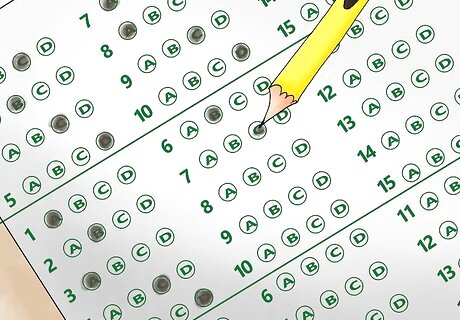
views
Succeed in High School

Challenge yourself. Seek out the most demanding and rigorous opportunities at your school, especially in the academic arena. It's often preferable to do well in a challenging program than to be exceptional in an average one. If your school offers advanced courses, especially those for which college credit is offered, an Ivy League school will expect you to have taken them. An example would be that working for an A in AP Physics is preferable to a straight 100 average in regular Physics. Schools can't factor difficult teachers into their decision. They can only go off your transcript. Look for classes that will be recognized as difficult, but preferably without overly difficult grading. It's most helpful to take difficult classes and work hard in subjects you expect to continue with in college, because they'll also make good grades there easier.

Start early. Aim to be a well-rounded achiever. A slacker who decides to start making good grades late in high school probably won't be admitted. You should have a consistent history of high scholastic achievement. Focus on your grades in school. There are sometimes exceptions as colleges also love to see improvement. If your problems were due to circumstances beyond your control, you could attach a supplement to your application about what they were and how you succeeded in spite of them.

Have an excellent GPA. Having a GPA in the top 5-10% of your class is essential, and being ranked among the top few students dramatically betters your chances. Keep in mind you're applying to institutions where many of the other applicants are valedictorians at their school.

Have excellent standardized test scores. This is a critical part of your overall application because it's the one area where you're on equal footing with everyone else. Aim for attaining at least a 700 (out of a possible 800) points on each section of the SAT (and on individual SAT II tests), or a composite of 30 on the ACT for a reasonable chance of being admitted. Bringing these scores up to 750+ on each SAT section (meaning at least 2250 out of 2400 points in total), or a 33+ composite ACT, will give you solid scores that need not be improved. Do not repeat the test more than three times. According to Chuck Hughes, a former senior admissions officer at Harvard, the admission panel will notice this and your repeated attempts to get a high score may come off as too focused on scores. Get good before you take it. Take a test-preparation class or get a few books and practice. Speed and accuracy on these tests is a unique skill which needs to be learned. Start preparing early and keep at it diligently until you can solve the problems without much thinking.

Get involved in extracurricular activities. Ivy Leagues want to see a well-rounded applicant who didn't lock themselves away for four years to get good grades. Join a sports team (even if it's just an intramural team), join a club or two and get involved with the theater department. Focus on extracurricular activities. Rather than joining every extracurricular that you can, try to excel in 2–3 of them that really interest you.

Volunteer. Think on a national or international scale; don't just limit yourself to the opportunities in your hometown. Spending a summer helping raise funds to build a school in Peru will mean more to them than raising funds for your local church.

Lead in the areas where you excel. Look for opportunities to take on additional recognition and responsibility as a leader. This can range from becoming class president to cheerleading captain, or even an officer for a club you participate in. Take your job as a leader seriously because the lessons you learn in this role can be the experiences that set you apart from the crowd when you write your essay or get interviewed.
Master the Application Process

Research schools. Not all Ivy League schools offer the same experience. Find out whether the research opportunities, location, social life, students, professors, climate, dormitories and food services are things you would enjoy for four years.

Visit the campus. Talk with professors and current students. Get a sense of what your life there would be like. Also, try to see if you can spend a weekend there. Several colleges offer that option.

Research financial aid opportunities. Ivy League schools are notoriously expensive and they do not offer any athletic, merit or regional scholarships. You must complete the Free Application for Federal Student Aid (FAFSA) to receive aid.

Get teacher recommendations. Seek out teachers who know you well, have a favorable opinion of you and seem willing to write a great recommendation on your behalf. Some will appreciate if you can make their job easier with a discussion or a few notes for starting points on what to say about you.

Polish your application. What many applicants do not realize is that high grades and test scores will not guarantee admission. They merely "get you through" the first round of rejections. After that, the college will examine what kind of person you are. This is done through one or more essays, teacher and counselor recommendations, an interview and sometimes a peer recommendation. Take the time to personalize your application essay. Begin the application process early so that you will have sufficient time to revise anything if needed. Ask adults familiar with prestigious universities' culture (your school counselor, for example) for advice on what kinds of things from your experience to write about and how to best present them to the school. This can help with interviews too. Be sure to mention reasons why you want to attend the specific school to boost your chances of attending.

Prepare for your interview. Interviews can be with someone from the admissions office of the university or an alumni, and range from relatively nonchalant to interrogative ordeals. Dress respectfully, be expectant of questions your interviewer may ask, but above all just be yourself - or a subtly more mature version! Find someone to give you practice interviews. Even if they aren't familiar with the process, they will help you stay relaxed and articulate. If your interview does not go well, do not worry. Interviews are rarely indicative of whether you will be accepted or not.

Sit back, and wait for the results. Most Ivy League decisions arrive in early April, or can be checked online the first of the month. A few schools will send out "likely letters" to their more desirable prospects 1-2 months earlier to informally notify them of their acceptance.
What to Do After Being Accepted Or Rejected

Do not allow your grades to significantly slip. Students can be dropped by schools for drastically declining grades. Any sort of arrest during this period will often result in an acceptance being taken away as well.

Consider other options for a wait-list decision. If you have been wait-listed, your chances of being accepted off the wait list are quite slim. Move on to your next choice.

Try transferring into an Ivy. If you do outstanding work at a second tier school, you can try transferring to an Ivy after a year or two. You might not receive credit toward graduation for the work done at the other school. You will probably be able to skip repeating introductory courses, but you might still have to take four years of courses, which means padding things out with more advanced courses or with courses you're interested in outside your major. Your degree is from the school where you finish, not where you begin. Some state colleges guarantee transfer admission to community-college students meeting grade requirements there. This can save you a bundle and even let you get in to a prestigious state college - not quite the Ivies, but close - which might refuse to admit you directly.

Look at graduate school programs for Ivy league schools. By doing outstanding work at an undergraduate program and performing very well on the appropriate admissions exam (e.g., GRE, LSAT) you may be able to be admitted to an Ivy League graduate program. In addition to providing excellent opportunities for scholarship, many of these programs offer opportunities for offsetting tuition and other expenses via teaching or research assistant positions. A prestigious graduate school can do much more to increase income in a highly-paid profession than a prestigious undergraduate program. For grad schools that focus heavily on grades, a slightly less-prestigious undergraduate program with generous grading might actually improve your chances of admission over more amorphous prestige and the good grades you'll have to claw for with tougher competition.




















Comments
0 comment